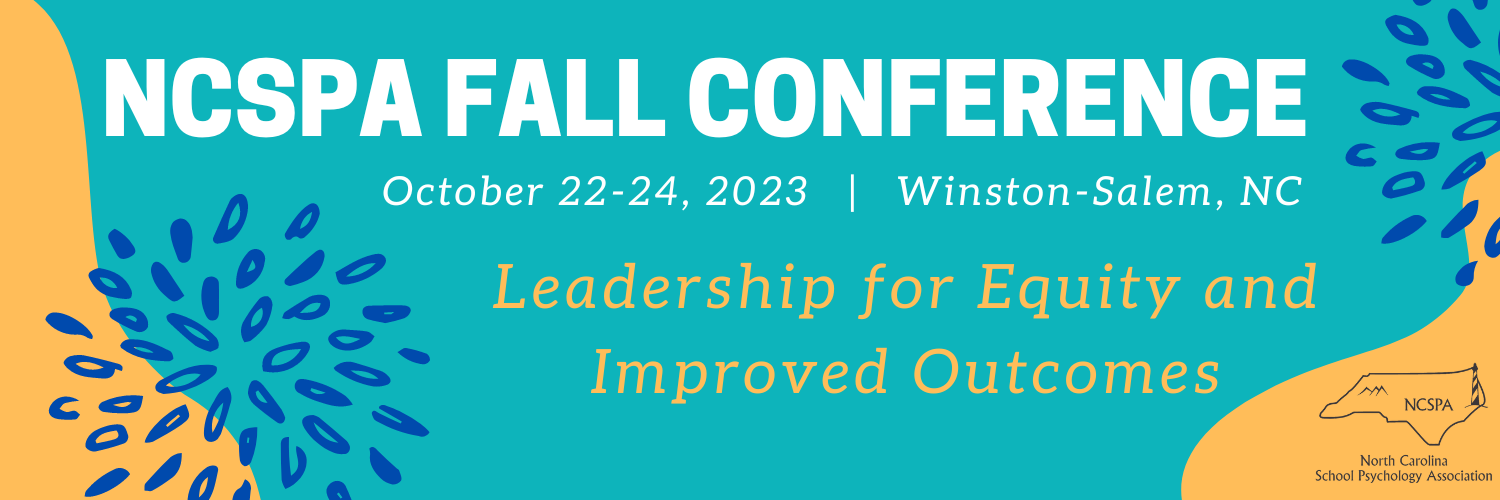|
||||||||||||||||||||||||||||||
|
In-person participants have the option of participating in any of the sessions. |
||||
|
In-person |
Virtual |
|||
|
9:00 am - 5:15 pm
|
2:00 - 3:30 pm How One Organization Centered Belonging to Scale-Up Adult SEL Beth Rice, MA, CAS |
2:00 - 3:30pm What Every School Psychologist Needs to Know about Guardianship and Supportive Decision Making Carol Kelly, PhD |
2:00 - 3:30 pm |
2:00 - 3:30pm It's Always About the Children: School Psychologists Bringing Their Whole Selves to the Profession Charles A. Barrett, PhD, NCSP |
| 3:45 - 5:15 pm Harnessing the Power of Grassroots Advocacy to Advance Equity Kelly Vaillancourt Strobach, PhD |
3:45 - 5:15 pm The Ups and Downs of Implementation: One district's experience with behavioral health screening and program supports Jennie B. Hyde, PhD |
3:45 - 5:15 pm |
3:45 - 5:15 pm Ethical Telehealth Practice for School Psychologists Aaron J. Fischer, PhD, BCBA-D, LP, LBA |
|
Session Descriptions & Learning ObjectivesUnless otherwise noted, each session meets criteria for NASP and APA approved credit hours. |
How One Organization Centered Belonging to Scale-Up Adult SEL
Beth Rice, MA, CAS - Specialist for State Projects, UNC-Greensboro SERVE Center
Bridget Johnson,PhD - Specialist for State Projects, UNC-Greensboro SERVE Center
Megan Orleans, MEd- Program Administrator, UNC-Greensboro SERVE Center
Participants will be able to:
- Discuss how to leverage their organization's vision and mission to center equity-focused SEL
- Describe how awareness (self awareness and social awareness) can foster empathy and belonging
- Utilize strategies and reflection to build an empathetic mindset
What Every School Psychologist Needs to Know about Guardianship and Supportive Decision Making
Carol Kelly, PhD
Advocate, Rethinking Guardianship NC Initiative
When students with intellectual or developmental disabilities approach 18, school personnel often suggest that parents seek guardianship. Current statutes state that taking a person's rights away must be a last resort. Research demonstrates that those with self-determination have better quality of life, more independence, better health, and community integration. Participants will explore alternatives to guardianship and hear from advocates, support organizations, as well as a self advocate who had his rights restored.
Participants will be able to:- Describe nationwide trends and research
- Discuss self determination in the context of state statutes
Stress & Self-Care
Kara Finch, EdD, HS-BCP
Dean of Public Service, Stanly Community College
Our professional and personal lives can make us all vulnerable to stress. In modern society, most of us cannot avoid stress. Secondary trauma, compassion fatigue, and burnout can be prevented. Doing so requires a conscious effort to practice self-care strategies on a regular basis, both personally and professionally, to assist in managing stress.
Participants will be able to:- Recognize burnout, compassion fatigue, and vicarious trauma
- Implement effective self-care strategies to assist with managing stressors of both personal and professional life
- Develop a self-care action plan
It's Always About the Children: School Psychologists Bringing Their Whole Selves to the Profession
Charles A. Barrett, PhD, NCSP
CAB Publishing Company, LLC
Dr. Barrett often says, “school psychologists are special people who take care of other people’s children as if they were their own.” Given the myriad challenges facing the fields of psychology and education, more than ever before, early career and veteran professionals need encouragement. Using personal experiences as a child with a stutter, and anecdotes that inform his teaching and clinical practice, Dr. Barrett will inspire and motivate attendees to view their roles as school psychologists serving children through the lens of purpose, which leads to passion, and ultimately unlocks the potential of young people.
Participants will be able to:- Explain the value of developing relationships with students, families, and schools for effective and culturally responsive clinical practice
- Reflect on how their personal experiences can inform what they do and how they serve children, families, schools, and communities as school psychologists
Harnessing the Power of Grassroots Advocacy to Advance Equity
Kelly Vaillancourt Strobach, PhD
Director of Policy and Advocacy, National Association of School Psychologists(NASP)
School psychologists have a responsibility, and ethical obligation, to engage in both professional and legislative advocacy to improve policy and practice. This session will provide participants with an overview of the current policy landscape at the national and state level, and describe how school psychologists can use their individual and collective voice to advance equity in opportunity and outcomes for all students.
Participants will be able to:
- Describe the impact public policy has on the role and function of the school psychologist and student outcomes
- Identify three concrete actions they can take to promote more equitable policy and practice
- Identify ways they can support the ongoing advocacy of NCSPA and NASP
The Ups and Downs of Implementation: One district's experience with behavioral health screening and program supports
Jennie B. Hyde, PhD, Lead School Psychologist, Wake County Public School System (WCPSS)
Emily Sturkie, School Psychologist, WCPSS
Mary Whitehouse, PhD, School Psychologist, WCPSS
Participants will be able to:
- Examine one districts prioritization of student behavioral health into strategic planning
- Describe how school psychologists are leading and supporting the work of student behavioral health at both the district and school building level
- Discuss practical implementation advice from successes and failure so you can (or won't) repeat them
- Apply knowledge of implementation science to problem solve issues surrounding implementation efforts
Supporting LGBTQ l+ Students in Schools
Rebby Kern
Director of Educational Policy, EqualityNC
Curious about all identities under the LGBTQ+ rainbow? Hoping to better support LGBTQ+ students when they come out? Looking to build a stronger portfolio of resources as you support the unique needs of LGBTQ+ students? This is the place for you. Join Equality NC to dive deeper in your foundational knowledge of supporting transgender and queer students in school settings. Ask all the questions and leave the session feeling more confident in your approach.
Participants will be able to:- Define key concepts related to gender identity, gender expression and sexual orientation
- Identify challenges and experiences of LGBTQ students in schools today
- Outline key health outcomes and mental health impacts for students in school
- Identify and implement best practices for supporting LGBTQ students, staff, and families
- Review current laws and policies that impact transgender and gender expansive students
Ethical Telehealth Practice for School Psychologists
Aaron J. Fischer, PhD, BCBA-D, LP, LBA
Associate Professor, University of Utah
Participants will be able to:
- Identify the ethical considerations involved in telehealth practice.
- Explain how to ensure confidentiality and informed consent in telehealth practice.
- Describe the competencies needed for telehealth practice.



